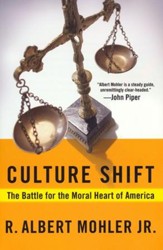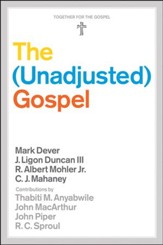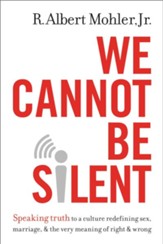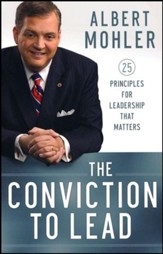
Quotes by Albert Mohler
Evangelical couples may, at times, choose to use contraceptives in order to plan their families and enjoy the pleasures of the marital bed. The couple must consider all these issues with care, and must be truly open to the gift of children. The moral justification for using contraceptives must be clear in the couple’s mind, and fully consistent with the couple’s Christian commitments.
Encouragement, however, is very different from coercion.
The common good argument is extremely powerful in the Christian tradition. Indeed, it is the second greatest commandment listed by Jesus Christ: to love our neighbors as ourselves. The general principle of the common good comes down to benevolence, love, care for others, laying down personal priorities for the service of others.
Christians do not believe in medical non-interventionism. Instead, we believe in the moral legitimacy of medical treatment. A Christian worldview authorizes treatment—and we do so as an extension of the doctrine of creation and the dominion God has given to humanity as revealed in the opening chapter of Genesis. Pressing against disease and viruses is part of our mandate. Some might say, “I believe in the sovereignty of God, and if God wants me to have this virus then He will give me the virus. I don’t need medical intervention because I trust God.” That kind of logic, if pressed to its logical conclusion, however, is untenable—we wouldn’t treat any sickness, cancer, or injury. Medical treatment is an extension of God’s common grace and Christians have always understood this. That is why, throughout history, where you found Christians you found hospitals and the church treating the sick.
As Christians growing into maturity in Christ, we don’t deny our feelings, but rather we pray for our feelings to be aligned with the gospel, aligned with the Word of God, aligned in ways that will only bring glory to Christ, aligned with biblical truth. We want our feelings not to drive the equation of decision-making and understanding. We want feelings to follow. We don’t want to be unfeeling. That would be to be unhuman. That would be a denial of how we are made in God’s image. That would be not only to be insensitive, but incapable of empathy. That can’t be right. But at the same time, we have to recognize it can’t be right for feelings to drive everything.
The Briefing, Our Dangerous Age of Feelings, Wednesday, June 10, 2020, Part 2. Used by Permission.
The biblical worldview tells us that we do have feelings, that our Creator made us to have feelings. But let’s just say that the Bible gives us due warrant for considering the danger of following our feelings, of letting our feelings drive us rather than say rational behavior or the exercise of the intellect or the exercise of the intellect as guided, informed by character.
The Briefing, Our Dangerous Age of Feelings, Wednesday, June 10, 2020, Part 2. Used by Permission.
When [pastors] measure whether or not (they) are successful, it must be by this criterion, namely, are we seeing the saints growing to completeness in Jesus Christ?
Feed My Sheep, ed. Don Kistler, Soli Deo Gloria Ministries, 2002, p. 29. Get this book!
The narcotizing effects of pornography will not be surrendered without a fight, but there is no fight evident on this culture’s horizon.
A rejection of the Bible’s authority on an issue such as homosexuality is a theological problem – not merely a moral controversy. No church can remain divided on this question, and no faithful believer should remain in a church that refuses to be bound to God’s Word.
While all Christians affirm the necessity and reality of the experiential dimension of faith, the experience must be grounded in and accountable to the Word of God.
First level theological issues would include those doctrines most central and essential to the Christian faith… Denial of these doctrines represents nothing less than an eventual denial of Christianity itself… The set of second-order doctrines is distinguished from the first-order set by the fact that believing Christians may disagree on the second-order issues, though this disagreement will create significant boundaries between believers… Third-order issues are doctrines over which Christians may disagree and remain in close fellowship, even within local congregations. I would put most debates over eschatology, for example, in this category… Christians should never separate from a church over third-order issues.
Should I Stay or Should I Go? September 2009, Tabletalk, p. 20-21. Used by Permission.
Third-order issues are doctrines over which Christians may disagree and remain in close fellowship, even within local congregations. I would put most debates over eschatology, for example, in this category. Christians who affirm the bodily, historical, and victorious return of the Lord Jesus Christ may differ over timetable and sequence without rupturing the fellowship of the church… Christians should never separate from a church over third-order issues.
Nothing is more important than our understanding of worship, for our concept of worship is inescapably tied to our understanding of God and His sovereign authority to reveal the worship He desires, deserves, and demands.
The best exhortation I know concerning (preaching Christ) comes from the great Baptist preacher, Charles Spurgeon, who, in speaking to his students about expository preaching, told them to preach the text as the text and, as soon as possible, you make a beeline to the cross and show its fulfillment in Jesus Christ.
Feed My Sheep, ed. Don Kistler, Soli Deo Gloria Ministries, 2002, p. 24. Get this book!
Is it our task to force the biblical doctrine of God to answer to modern culture, or (is it our task) to address modern culture with the biblical doctrine of God? If modern culture-or any culture-establishes the baseline for the doctrine of God, such a doctrine will certainly bear little resemblance to the God of the Bible.
There is only one authority that is the preacher’s authority, and there is only one authority that undergirds and justifies his teaching ministry, and that is the authority of the Word of God. This Word is inerrant, infallible, authoritative, and trustworthy. It is that Word, and that Word alone, that is our authority; and it is not only the foundation, but the substance, the content of our teaching and preaching.
Feed My Sheep, ed. Don Kistler, Soli Deo Gloria Ministries, 2002, p. 28. Get this book!
Where the authentic preaching of the Word takes place, the church is there. And where that is absent, there is no church. No matter how high the steeple, no matter how large the budget, no matter how impressive the ministry, it is something else.
Feed My Sheep, ed. Don Kistler, Soli Deo Gloria Ministries, 2002, p. 18. Get this book!
The doctrine of assurance looks into eternity past to the eternal purposes of God, looks into history to the accomplished work of Christ, and looks to the future toward the perfect fulfillment of God’s purpose to redeem a people through His Son.
Assured by God, ed. Burk Parsons, P&R, 2006, p. 56. Used by Permission. Get this book!
When the minister of the gospel faces the Lord God as judge, there will be many questions addressed to him. There will be many standards of accountability. There will be many criteria of judgment, but in the end the most essential criterion of judgment for the minister of God is, “Did you preach the Word? Did you fully carry out the ministry of the Word? In season and out of season, was the priority of ministry the preaching of the Word?”… There is one central, non-negotiable, immovable, essential priority, and that is the preaching of the Word of God.
Feed My Sheep, ed. Don Kistler, Soli Deo Gloria Ministries, 2002, p. 16. Get this book!
In the end, the only sufficient reason for separating from a church is theological. A faithful Christian must separate from a congregation or denomination when that body obstinately rejects efforts at doctrinal correction over an issue of true significance.
When members leave [the church] for insufficient reason, the fellowship of the church is broken, its witness is weakened, and the peace and unity of the congregation are sacrificed. Tragically, a superficial understanding of church membership undermines our witness to the gospel of Christ.
The Christian virtue of patience is rooted in our knowledge of ourselves as redeemed sinners. Knowing our own frailty, and all too aware of our own faults, we must deal with other Christians out of humility rather than pride. The Christian has no excuse for responding to fellow believers in a spirit of arrogance, haughtiness, or superiority.
We must understand that patience is both a command and a gift from God… As a command, patience arrives at the Christian conscience as a matter of accountability. At the same time, patience is a divine gift. Christians are not able, in and of themselves, to demonstrate true patience as a fruit of the Spirit… [Patience] comes only to those who have been redeemed by Christ and in whom the Holy Spirit is calling forth the fruit of the Spirit.
Patience is a vibrant and virile Christian virtue, which is deeply rooted in the Christian’s absolute confidence in the sovereignty of God and in God’s promise to bring all things to completion in a way that most fully demonstrates His glory.
What do we think preaching is but the central act of Christian worship? As a matter of fact, everything else ought to build to the preaching of the Word, for that is when the God of whom we have been speaking and singing speaks to us from His eternal and perfect Word.
Feed My Sheep, ed. Don Kistler, Soli Deo Gloria Ministries, 2002, p. 17. Get this book!
Sex only makes sense within the Christian worldview. Christians, alone on earth, understand by the grace of revelation that God has a purpose for sexuality that eclipses any human aspiration. At the same time, we understand that sex isn’t everything and everything isn’t sex.
Christians must confront a sensate culture with the biblical vision of human sexuality. The Bible offers more than a fallen world can ever imagine, placing sexual pleasure within the holy covenant of marriage, combining restraint with passion, pleasure with protection, sense with sensibility.
The attractiveness of idols is because they are visual, portable, tangible, manageable and servable.
Leaders are the stewards of vision, conviction, beliefs, and strategic decisions.
The Conviction to Lead, Bethany House Publishers, 2012, p. 117, Used by Permission.
Get this book!
We all know of those in leadership positions who seem to make vacillation a virtue. This is disastrous. Organizations suffer and even die by indecision, but some people seem to have little or no confidence in their decision-making ability. Are they missing a decision-making gene? No, they lack the courage of their convictions, the discipline of critical thinking, or the confidence of steady leadership.
The Conviction to Lead, Bethany House Publishers, 2012, p. 65, Used by Permission.
Get this book!
The best teachers are those who simply can’t wait to teach something they truly love.
The Conviction to Lead, Bethany House Publishers, 2012, p. 71, Used by Permission.
Get this book!
Average leaders are satisfied to use average words in an average way. Effective leaders, those who aspire to lasting and extended influence, will learn to use words as arrows fired from a bow, carefully chosen and aimed in order to accomplish a purpose.
The Conviction to Lead, Bethany House Publishers, 2012, Used by Permission.
Get this book!
Leaders have to make decisions day by day. Convictional leaders are determined to make the right decisions, grounded in those convictions. But at the end of the day, all we can do is make the best decisions we can, knowing that the final verdict will not come from shareholders, board members, church members, or even historians, but from God. “Well done, good and faithful servant” is the verdict for which we strive and hope. The decision to aim for that verdict is one we had better make right now before it is too late.
The Conviction to Lead, Bethany House Publishers, 2012, p. 147, Used by Permission.
Get this book!
Speaking is an art and a craft, not a science. The most effective speaker’s love language and enjoy telling a tale. They experiment with different ways of using words and sentences, different strategies for constructing messages and talks. Leaders who are good speakers learn to use their voice as an instrument rather than a piece of equipment. They learn how to use humor without becoming comedians; to arouse emotion without selling out to emotionalism; and to make an audience want more, not less, from the speaker.
The Conviction to Lead, Bethany House Publishers, 2012, p. 126-127 , Used by Permission.
Get this book!
With power and responsibility must come accountability. A leader without accountability is an accident waiting to happen.
The Conviction to Lead, Bethany House Publishers, 2012, p. 112, Used by Permission.
Get this book!
The Christian leader will respect the role of power in leadership but will never glory in it…The Christian leader will serve by leading and lead by serving, knowing that the power of office and leadership is there to be used, but be used toward the right ends and in the right manner. Power can never be seen as an end in itself.
The Conviction to Lead, Bethany House Publishers, 2012, p. 112, Used by Permission.
Get this book!
Convictions are the product of both head and heart. There is an emotional component to belief, as well as an intellectual component. The Christian tradition speaks powerfully of the commitment of belief as a matter of the heart. Christian convictions take possession of our heads and hearts through Christian teaching and the preaching of God’s Word. As a matter of fact, most of us gain our most fundamental convictions in just this way – we hear them, see them to be truly revealed in the Bible, and then believe them.
The Conviction to Lead, Bethany House Publishers, 2012, p. 100, Used by Permission. Get this book!
Communication requires courage for the very simple reason that, if your convictions mean anything at all, someone will oppose you. If opposition to your ideas and beliefs offends you, do not attempt to lead. Every leader knows the experience of rejection and opposition. You must prepare for it, expect it, and deal with it when it happens.
The Conviction to Lead, Bethany House Publishers, 2012, p. 95, Used by Permission.
Get this book!
A God-centered worldview brings every issue, question, and cultural concern into submission to all that the Bible reveals, and frames all understanding within the ultimate purpose of bringing greater glory to God. This task of bringing every thought captive to Christ requires more than haphazard Christian thinking, and is to be understood as the task of the church and not merely the concern of individual believers. The recovery of the Christian mind and the development of a comprehensive Christian worldview will require the deepest theological reflection, the most consecrated application of scholarship, the most sensitive commitment to compassion, and the courage to face all questions without fear.
The Conviction to Lead, Bethany House Publishers, 2012, p. 45-46, Used by Permission.
Get this book!
Managers can do their work by ordering people to do something, but leaders are never satisfied with people taking orders. Leaders want to see every member of the organization learn what must be done, and why. Leaders are not satisfied until every individual understands the mission, embraces it, and bring others into it.
The Conviction to Lead, 2012, Bethany House Publishers, p. 20, Used by Permission.
Get this book!
I stake my life on the priority of right beliefs and convictions, and at the same time I want to lead so that those very beliefs are perpetuated in others. If our leaders are not passionately driven by the right beliefs, we are headed for disaster. At the same time, if believers cannot lead, we are headed nowhere.
The Conviction to Lead, 2012, Bethany House Publishers, p. 20, Used by Permission.
Get this book!
When a leader walks into the room, a passion for truth had better enter with him. Authentic leadership does not emerge out of a vacuum. The leadership that matters most is convictional—deeply convictional. This quality of leadership springs from those foundational beliefs that shape who we are and establish our beliefs about everything else. Convictions are not merely beliefs we hold; they are those beliefs that hold us in their grip. We would not know who we are but for these bedrock beliefs, and without them we would not know how to lead.
Convictions are not merely beliefs we hold; they are those beliefs that hold us in their grip. We would not know who we are but for these bedrock beliefs, and without them we would not know how to lead.
Contrast the priority of convictional intelligence with the models of leadership that are often found and even admired in some Christian circles. Charisma is a great gift, but it cannot substitute for conviction. The same is true of personality skills, gifts of communication, media presence, and organizational ability. None of these things can qualify a Christian leader when conviction is absent or weak.
Many Christians now speak of the Bible’s metanarrative – its all-encompassing story line. In the Bible, God has revealed the story that underlies every true story, and in which every other true story finds its meaning. That is the story of God’s determination to glorify Himself by saving sinners through the atonement accomplished by His own Son. As Christ Himself made clear, every word of Scripture serves to tell this story.
Redemption. This was promised in the Old Testament, but was fulfilled with the coming of Christ, fully God and fully man, who lived a sinless life and went obediently to suffer death on a cross, dying in our place. God saves us by accepting the substitutionary sacrifice of Christ as full payment for the penalty of sin, and He raised Christ from the dead on the third day, announcing to all the vindication and completion of the Son’s saving work. Salvation is declared to all who believe on His name and confess Him as Savior and Lord.
The Conviction to Lead, Bethany House Publishers, 2012, p. 41, Used by Permission.
Get this book!
Passion is not a temporary state of mind. It is the constant source of energy for the leader, and the greatest cause of attraction for followers… Passion cannot be artificially generated or transmitted. If authentic, it naturally shines through as convictions come to life, as a great mission is undertaken, and as people share the same great passion and join together as one.
Most human beings evidently do not like to think. At the very least, most seem quite satisfied never to think in a concerted, critical, and careful way. [They] never think strategically, consistently, or critically. They go from thought to thought without reflection, analysis, or questioning their own decisions. They operate at the basic level of thinking, and they think about the things that interest them, but they are not seriously interested in the process and quality of thought.
The Conviction to Lead, Bethany House Publishers, 2012, p. 59, Used by Permission.
Get this book!
The wise leader lays out the alternatives and then walks the organization through the process of understanding which decision or direction is best…Followers learn that decisions are made with strategic thinking, care, and a commitment to truth, and on the basis of convictional intelligence. Leaders who fear acknowledging alternatives to their decisions undermine their own credibility. Oracles have to be infallible. Leaders only have to be right – and that means getting to the right decision for the right reasons.
The Conviction to Lead, Bethany House Publishers, 2012, p. 64, Used by Permission.
Get this book!
We cannot buy passion, nor can we simply decide to be passionate… Passion arises naturally or not at all. It happens when convictions come to life, and deep beliefs drive visions and plans. The passionate leader is driven by the knowledge that the right beliefs, aimed at the right opportunity, can lead to earth-shaking changes.
The Conviction to Lead, Bethany House Publishers, 2012, p. 52-53, Used by Permission. Get this book!
What does it really mean to affirm God’s sovereignty…? It means that God rules over all space and time and history. It means that He created the world for His glory and directs the cosmos to His purpose. It means that no one can truly thwart His plans or frustrate His determination. It means that we are secure in the knowledge that God’s sovereign purpose to redeem a people through the atonement accomplished by His Son will be fully realized.
The Conviction to Lead, Bethany House Publishers, 2012, p. 135, Used by Permission.
Get this book!
Humor humanizes and warms the heart. Those who follow you know that you have weaknesses and foibles, so let them share in the humor you direct at yourself. Humor should never be used at another’s expense, but it can be used to make people feel at ease, to relieve tension, and even to affirm humanity. Humor must never be crude or disrespectful, but it can build respect.
The first thing we learn about time in the Bible is that God created it and that time is contrasted with eternity. Time characterizes creation, but the Creator is eternal. God is not bound by time, and He created time as a feature of creation that reveals His glory. This means that we must always understand time against the backdrop of eternity and God’s eternal purposes… We…are limited to the same twenty-four-hour day. But we are not limited to the horizon of earthly time. We want our lives to serve an eternal purpose.
Not all managers are leaders, but all leaders are managers.
The Conviction to Lead, Bethany House Publishers, 2012, p. 115, Used by Permission.
Get this book!
There will never be enough time to read all that you want to read, or even all that you think you ought to read. Just keep reading. Set aside segments of time devoted to reading and grab every spare minute you can find. Keep reading materials with you at all times, or at least close at hand.
Treat the book as a notepad with printed words. In other words, write in your books. Make the book your own by marking points of agreement and disagreement, highlighting particularly important sections of text, and underlining and diagraming where helpful. Unless your specific copy of the book has some historical or emotional value, mark it up with abandon.
The Conviction to Lead, Bethany House Publishers, 2012, p. 102, Used by Permission.
Get this book!
Learn to read critically. Reading is not merely an exchange of information and ideas. It is a conversation between the author and the reader. Think of reading as a silent but intensive conversation. As you read, ask the author questions and filter the book’s content through the fabric of your convictions. Argue with the book and its author when necessary, and agree and elaborate when appropriate.
Forgiveness does not restore credibility, and character must be seen as something that can be lost far easier than gained, much less restored.
The Conviction to Lead, Bethany House Publishers, 2012, p. 80, Used by Permission.
Get this book!
Convictions are the product of both head and heart. There is an emotional component to belief, as well as an intellectual component. The Christian tradition speaks powerfully of the commitment of belief as a matter of the heart. Christian convictions take possession of our heads and hearts through Christian teaching and the preaching of God’s Word. As a matter of fact, most of us gain our most fundamental convictions in just this way – we hear them, see them to be truly revealed in the Bible, and then believe them.
Communication requires courage for the very simple reason that, if your convictions mean anything at all, someone will oppose you. If opposition to your ideas and beliefs offends you, do not attempt to lead. Every leader knows the experience of rejection and opposition. You must prepare for it, expect it, and deal with it when it happens.
If a leader has to look for a message, his leadership is doomed. Leaders communicate because they cannot not communicate, and their message flows out of them as naturally as a geyser releases its energy. This is the essence of convictional leadership. The message flows out of your deepest convictions and most passionately held beliefs. The most powerful leaders are those whose beliefs function like an engine of meaning – pushing out words and messages and compelling communication.
The leader may have the most brilliant strategy in his mind, the most breathtaking vision in his sights, and an irrepressible passion in his heart, but if these are not communicated to others, real leadership just doesn’t occur.
Leaders of character produce organizations of character because character, like conviction, is infectious. Followers are drawn to those whose character attracts them as something they want for themselves.
Character is indispensable to credibility, and credibility is essential to leadership.
The Conviction to Lead, Bethany House Publishers, 2012, p. 72, Used by Permission.
Get this book!|The Conviction to Lead, Bethany House Publishers, 2012, p. 80, Used by Permission.
Get this book!|The Conviction to Lead, Bethany House Publishers, 2012, p. 80, Used by Permission.
Get this book!
We cannot add time; we can only exercise stewardship over the time we are given.
The Conviction to Lead, Bethany House Publishers, 2012, p. 186, Used by Permission.
Get this book!
The American ideal of retirement does not meet the Christian standard of faithfulness. For Christians the issue should be redeployment rather than retirement.
We do not believe in belief any more than we have faith in faith. We believe the gospel, and we have faith in Christ. Our beliefs have substance and our faith has an object.
The Conviction to Lead, 2012, Bethany House Publishers, p. 22, Used by Permission. Get this book!
If the college you visit has a bookstore filled with t-shirts rather than books, find another college.








